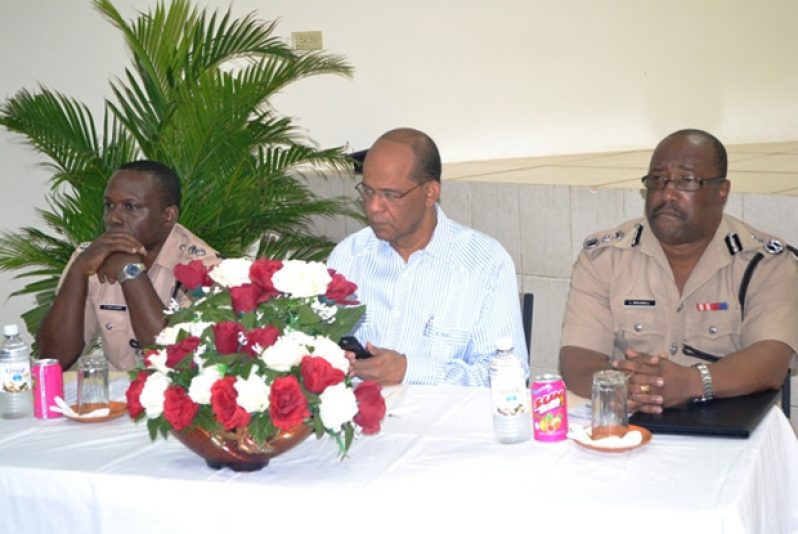THREE core courses which focused on capacity building were conducted for about 70 officers of the Guyana Police Force (GPF) under the theme ‘Advancing institutional modernisation to secure our communities through enhanced professionalism, partnership, strategic management and effective leadership.’

The closing ceremony for the courses was held at the Officers’ Training Centre, Camp Street on Monday, where a recap of the courses indicated that the main focus was on the theme.
The Junior Officers’ Course No. 24, Station Management Course No. 1/2013 and Elementary Prosecutors Course No. 1/2013 are critical to the force. Job performance and critical issues and challenges were considered during the course, with the aim of meeting challenges in modern times, in keeping with international best practices.
Minister of Home Affairs, Clement Rohee observed that two of the courses attracted attendees from other government agencies, and encouraged management to continue along this line. He noted that the Junior Officers’ Course would provide benefit to the force, since they were provided with the opportunity to be more versed about their functions, while being prepared to assume higher positions in the organisation.
Minister Rohee said that inspectors were identified for training, not only to improve their management skills and related duties. ‘The course also provided an opportunity for them to be assessed by their superiors as regards their suitability for higher office,” he said.
Regarding the Station Management Course, he noted that it was an important training opportunity for those who participated. “The ability of the Guyana Police Force to serve the needs of our communities depends to a large extent on the quality of management of police stations. If good management is placed at the stations, fewer complaints would be received from the public as responses to their reports would be more efficiently and effectively handled, and the force’s public relations would be improved.”
The Elementary Prosecutors’ Course, he said, was vital to the effective prosecution of cases in the Magistrates’ Court, “and enables our prosecutors who are not lawyers to develop the necessary skills to match those of defence lawyers to successfully present their cases before the court.”
He emphasised that all three courses are aimed at building the capacity of the force, consistent with the objective of the modernisation project.
He noted that changes are rapidly evolving and Guyana, as a developing country, faces challenges similar to those of developed countries because of the effect of globalisation. He warned that as changes evolve, the law enforcement agencies cannot be left behind.
“The Guyana Police Force, in particular, must respond in a positive way to these changes that are taking place in our society in an effort to raise the level of policing, to address police challenges in the 21st century.” He added that although the fundamentals have not changed dramatically over the years, the methodology would have to be adjusted to meet current circumstances.
He pointed out that the ministry’s efforts to effect changes are aimed at providing a better quality of service, and urged participants to buy in to the modernisation system of the force. He pointed out that their output resulting from training would have a positive effect on the force.
Stating that he would like to see a modern police force, he emphasised that this would not be possible without training. “It is my expectation that the training you have gained during these past weeks will be helpful in making your various assignments easier to accomplish. Additionally, in the case of participants from other agencies, I hope that you were able to gain enough knowledge that will enable you to function more effectively in your respective organisations, and have a better understanding of the relevant aspects of policing.”
Commissioner of Police, Leroy Brumell said that the participants who were meticulously selected to attend the courses had shown signs of budding managers and their participation should add to their upward mobility as they become assets to the force.
He added that such courses allow for public interaction, conflict resolution and organisational procedures. He said they are also “designed to produce middle managers in support of senior functionaries, “thus we would expect maximum growth and effective communication throughout the spheres that encompasses our motto ‘Service and Protection,” he stated.
The Top Cop called on participants to share and put into constant practice all that they have learned during the courses for the continuous development of the force. He noted that as middle managers, they need to encourage others ‘from here on and beyond, for no one can lead an organisation without adequate support.”
The Junior Officers’ Course featured 50 subject areas which were divided into two modules. The topics included politics, conflict resolution, corporate communication, management, social change, working with diverse groups and professional ethics.
The Station Management Course lasted five weeks and included topics such as station management administration, aspects of the Police Force organisation, institutional modernisation, coping with change and policing diverse communities among others.
The Elementary Prosecutors’ Course of six weeks’ duration was aimed at kindling new echelons for successful prosecution through professionalism. The objective of the course was to improve the policy of prosecution in law enforcement. (GINA)



.jpg)









